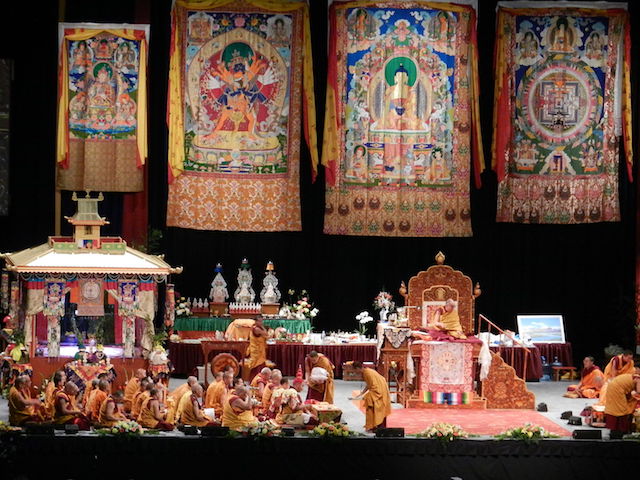
Sometimes in our enthusiasm to receive tantric initiations, we can lose sight of the fact that a good deal of preparation is necessary in the form of creating the emotional and psychological space for it in our lives.
Tantra practice (the Buddhist kind, not the kind that’s all about sex) involves the visualization of deities and/or visualizing oneself as the deity, and many other ritual practices, such as, reciting mantras, reading a liturgy, contemplation, and meditation. All of which require a good deal of “stage setting” and making ourselves viable candidates for successful tantric practice.
When Buddhist teachers speak of “mandala meditation,” tantric rituals, and so forth, we all are easily absorbed, but when the topic turns to morality, ethics, restraint of desire, and so forth, we feel a little defensive and probably not very interested.
When I attended the Kalachakra empowerment at the Staple Center in Washington D.C. a few years ago, the hall was only a third full during the first seven days, but it filled up for the last three. The first week of the empowerment concerned itself with building a strong moral and ethical base, while the last three were the actual empowerment.
Dismayed, His Holiness the Dalai Lama remarked to his newly arriving attendees that if they couldn’t attend the entire event, they would benefit far more by attending the earlier days leading up to the empowerment than the empowerment itself.
The Kalachakra imagery is exceptionally licentious. With its deities in union at the center of the mandala, one would hardly expect that the initiation not only concerns itself with moral behavior and precepts, but requires it. Yet it is these foundational teachings that are largely ignored, despite all the admonishments over the years by His Holiness the Dalai Lama.
It is an interesting phenomenon that the greatest suffering people go through is often related to intimate relationships gone wrong, as well as drugs and alcohol. Yet, when it comes to dharma teachings, the last thing we want to hear is talk that might prevent us from getting ourselves into situations that expose us to such suffering.
Rules of conduct, particularly those prohibiting sexual misconduct and taking intoxicants, are not popular subjects. Other unpopular subjects, that often accompany these two, are curbing food intake and greed, not sleeping too much, practicing charity, and so forth.
The aim of meditation is to generate happiness on many diverse levels. But, if we are distracted by our own emotional problems, it will be difficult or impossible to meditate. The Buddha knew this, and in his wisdom laid forth rules of conduct as prerequisites to meditation.
Even if we want to control our desires, we may feel totally helpless, like a puppet moved about on strings. When desire rages, we feel it is our business whether or not we follow the direction we are being pulled, and when someone or some teaching interferes with that perceived “right,” we take offense and rebel. Yet, when we fall hard, we suddenly seek comfort in religion. We seek out gurus, read scripture, attend teachings, and associate with dharma groups. We seek all the support we can get.
When it comes to desire, we are like insects attracted to fire, often hurting ourselves by what attracts us. Yet, paradoxically, any advice to stay away from the flame is unwelcome. No wonder there are many who walk the path, but few who arrive. Indeed, even those of us who have listened well to good advice do just the opposite, myself included. Desire is a formidable opponent and can easily overpower our morally minded ambitions. So, being morally minded is not a sure thing either, but our chances are better.
Regardless of whether we want to subscribe to a morality agenda or not, we should be willing to admit our desires are often not our friends. Where desire is strong, our judgement is weak. So, teachers such as the Dalai Lama spend considerable amount of effort to show us how to undermine the pull of desire so that we can make more objective and unbiased decisions directing our lives and selecting amongst our options. Desire is a notoriously deceptive criterion for making choices, and obtaining objectivity will help us sort it all out. If we can send desire on holiday, our chances of making good decisions increases considerably.
It is true that there are examples of great masters, both Hindu and Buddhist, who have lived licentious and outrageous lives while also offering many enlightened teachings and attracting many disciples. But, even in the rarefied air of highly qualified masters, most have thought it wiser to free themselves from attachments: material, romantic, and otherwise.
There are many tantras similar to the Kalachakra, and they are being taught widely in the West. Unlike the yearly Kalachakra, however, which is a 10 day, all day event, most initiations are a couple of hours and often the preceptor’s initiation is little more than a “right” to study and practice, and a blessing direct from him or her to do so. That is what a modern tantric initiation generally is.
Having received a typical tantric initiation, we have a responsibility to ourselves, and the master offering it, to do all that we can to prepare ourselves for the practice. This entails investigating the tantric texts themselves and finding in them the tools we need to create a solid foundation to engage in the rituals we were initiated into. This is often the unspoken and assumed instruction of a short initiation. We will find these instructions in the body of the texts of each tantra.
Foundation practice may not be sexy, but we owe it to ourselves not to ignore it.
~
~
~
Author: Richard Josephson
Image: Wikicommons
Editor: Travis May
Copy Editor: Callie Rushton
Social Editor: Lindsey Block
 Share on bsky
Share on bsky




Read 0 comments and reply